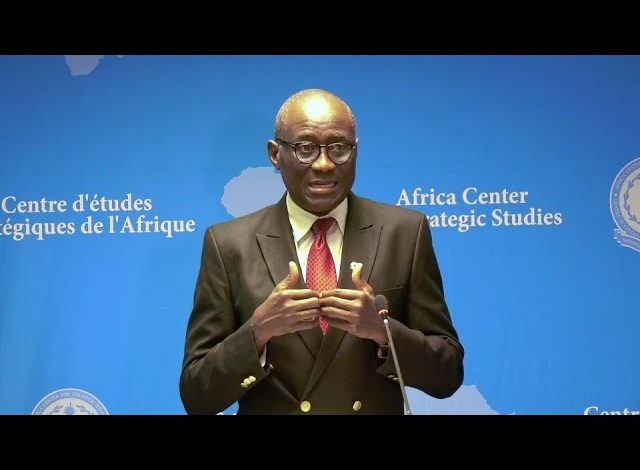Nigeria’s ‘Insecurity Epidemic’ Must Be Addressed Like COVID-19, Analysts Propose

Political leaders, researchers, and experts on security governance have called for reforms in the ways Nigeria’s military and civilian structures address problems of insecurity.
They particularly suggested that a leaf should be borrowed from the national response to the COVID-19 pandemic.
This observation was made on Saturday during a webinar organised by the Whiteink Institute for Strategy Education and Research (WISER) that focused on the roles of Nigeria’s civil and public services and political institutions generally in governing the security sector.
One of the panellists and a former military governor of Kwara and Kano states, Mohammed Ndatsu Umaru, stressed that security cannot be discussed without reference to politics and good governance.
“Today, we are faced with an epidemic of insecurity just like we have COVID-19. How are we attacking COVID-19 or what happened earlier? We have to now approach security that way because it is now an epidemic,” he said.
The implication of this, he explained, is that the country needs concerted efforts to implement joint reforms.
“The armed forces must be directed to do the right thing. We need more than a think tank, we need a think-and-do tank. We have been thinking all our lives, since 1960, but we have not taken action,” Umaru said.
The former governor also argued that credible local government elections that allow the emergence of competent leaders are key in curbing the outbreak of violence in various communities.
Dr Mahmoud Yayale Ahmed, former Defence Minister and Secretary to the Government of the Federation, agreed that the cooperation of all government agencies is crucial.
“What is lacking in the security architecture of this country and why the bureaucracy cannot do much is because these security agencies sometimes become a little bit arrogant in terms of alienating others and taking advantage of being close to the presidency,” he said.
“This may be a good thing but, in the final analysis, the kind of coordination that is required will not be there.”
He also blamed corruption and lack of patriotism in the civil service and security institutions for rising insecurity.
When military personnel are actively involved in the procurement of arms, he said, their priorities change from tackling existing problems to profiting from the process.
For Dr Hakeem Baba-Ahmed, former Permanent Secretary at the Foreign Affairs Ministry, the underlying problems are the same: poor coordination, weak political will, inter-arm rivalry, pervasive corruption, and the sidelining of such offices as those of the Defence Minister and the National Security Adviser.
He explained that the decline in professional standards could be traced to the military coups from 1966 that caused military officers to fall into the weaknesses of political processes.
He said even though Nigeria has been ruled for over 13 years by two presidents who were former military heads of state, the country had not benefited from their cumulative experiences.
He added that, in fact, under them “the security of the country has become progressively deteriorating and worse off than it was before.
“The competence of the bureaucracy has been weakened substantially, one, by the exposure of the military to politics, two, by the exposure of the military to corruption, and three, by the absence of political will, particularly under the administration of President Buhari.
“You have a very distant, very removed Commander-in-Chief of the Armed Forces,” he summarised.
Also speaking at the webinar, Lt. Gen. Chikadibia Isaac Obiakor, former military adviser for Peacekeeping Operations and former Force Commander of the United Nations Mission in Liberia, emphasised the need for a foundational philosophy guiding public servants.
“There are too many things undone and things are getting worse by the day. The ministry of defence today is not managing any defence structure.
“Basically we have the armed forces in disarray, and this is not only with the ministry, it is with all security agencies,” he lamented.
“As it is, Nigeria has weak security structures. We are very qualified for a security sector reform,” Obiakor added.
Especially addressing the Nigeria Police, Assistant Director and Head of Operations at the Geneva Center for Security Sector Governance, Dr Mark Downes, said officers could not be expected to act differently if there is impunity, political manipulation, inadequate salaries, and unfair staff promotion.
“We should put human security on the same footing as state security,” he suggested.
“The focus on state security needs to be balanced with an understanding of how an individual experiences insecurity or injustice.
“It is of critical importance to approach reforms from a citizen perspective rather than seeking to build the functions and capacity of security institutions hoping that this would somehow trickle down to impact the citizen.”
Other panellists who contributed to the conversation were Dr Abdullahi Yahaya, senate majority leader and former permanent secretary of the Ministry of Niger Delta; Dr Temitope Oriola, Associate Professor of Criminology and Sociology at the University of Alberta.
Others were Prof Habu Galadima, Director General of the National Institute for Policy and Strategic Studies; and Nnenna Elendu-Ukeje, a 12-year member of the House of Representatives and two-term chairperson of its Foreign Affairs Committee.
Brig Gen Selah Bala (Rtd), president and founder of WISER, said during its next high-level conference, the institute would be examining “the role of the private sector in supporting the security governance in a nation like ours”.
Support Our Journalism
There are millions of ordinary people affected by conflict in Africa whose stories are missing in the mainstream media. HumAngle is determined to tell those challenging and under-reported stories, hoping that the people impacted by these conflicts will find the safety and security they deserve.
To ensure that we continue to provide public service coverage, we have a small favour to ask you. We want you to be part of our journalistic endeavour by contributing a token to us.
Your donation will further promote a robust, free, and independent media.
Donate HereStay Closer To The Stories That Matter




